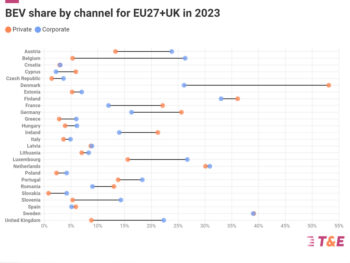UK corporate car sales greener than many countries in Europe
New analysis by Transport & Environment has found that the UK is outperforming many European countries in the electrification of new corporate cars.

UK corporate car sales greener than many countries in Europe
The strength of this market has been driven by beneficial tax rates (benefit-in-kind) for battery electric vehicles (BEVs), which T&E UK is calling for an extension on, and the growth of salary sacrifice schemes.
In 2023, 22% of new corporate car registrations were BEVs meaning the UK ranks 8th for share of corporate BEV registrations in Europe and 4th in western Europe behind the Netherlands, Luxembourg and Belgium. Still, it remains significantly ahead of France and Germany. The corporate channel was responsible for 75% of all UK BEV sales in 2023.
The corporate channel, which made up 57% of new sales in 2023, is going to be increasingly responsible for driving the transition to zero emission vehicles especially as the ZEV mandate kicks in and takes the proportion of new car sales being all-electric to over 50% in 2028.
Company cars are responsible for a disproportionate share of emissions as they drive 2.5 times the annual distance of private cars. Paired their short ownership periods of three to five years, means that faster electrification of the sector would reduce road emissions substantially. It would also have a knock-on effect of supplying the used car market with BEVs much more quickly, significant as used cars made up 79% of all car sales in the UK in 2023.
Corporate electrification has been largely driven by leasing companies in the UK. Nearly 41% of new registrations made by leasing companies were BEVs in 2023 – higher than any country in Europe. Other corporate segments, however, like true fleets (companies buying or owning their vehicles) and rental companies lagged behind with respective BEV shares of 13.2% and just 3% respectively.
To boost BEV uptake across the whole corporate market, T&E UK is calling for the tax differential between BEVs and petrol and diesel cars to be extended beyond 2027/28, and changes to depreciation rules or introducing higher vehicle excise duty for non-ZEV corporate cars.
There remains some worrying trends in the corporate channel, however. Corporate plug-in hybrids (PHEVs) sales made up nearly three quarters of all PHEVs sold in 2023, largely due to the generous tax breaks being extended to them as well as BEVs. Recent data from real world emissions testing by the European Commission confirmed however that test cycle emissions testing of PHEVs starkly underestimates their real world emissions by around 3.5 times.
Meanwhile, Sports utility vehicle (SUV) sales are also high in the corporate channel with 62% of all new corporate registrations in 2023 being SUVs. The UK is the corporate SUV capital of Western Europe and is a major cause for concern due to the environmental, safety and space implications that an increased proportion of these vehicles bring.
T&E UK is calling for benefit-in-kind rates for PHEVs to be regraded beyond 2028 to reflect their real world emissions and that the taxation of BEV company cars after 2030, factors in weight or efficiency to encourage smaller, more affordable cars to enter the corporate channel.
Ralph Palmer, UK electric vehicle and fleets officer at Transport & Environment, said: “The success of the UK’s corporate fleets sector driving the transition to battery electric vehicles cannot be understated – it shows the power of progressive taxation. The new government must not think it’s “job done” on corporate cars, and instead play a proactive role to ensure that the corporate channel stays headed in the right direction. Providing longer-term certainty for beneficial tax rates for electric company cars, addressing the perverse incentive for PHEVs and tackling increasing corporate SUV sales, while taking steps to provide greater confidence for the wider EV market, should all be on the new Minister’s agenda.”















